This is my model class
class UserRoot : Mappable {
var success : Bool!
var user : UserDetails!
var error = ""
required init?(map: Map) {
}
func mapping(map: Map) {
success <- map["success"]
user <- map["user"]
error <- map["error"]
}
}
after successfully login i want to save this data on user defaults so that when a user have to not give login credential again. Here is my code
class Default : NSObject{
static func saveToSharedPrefs(user: UserDetails!) {
let d = UserDefaults.standard
if user != nil {
d.set(Mapper().toJSONString(user, prettyPrint: false) , forKey: "USERDETAILS")
} else {
d.set(nil, forKey: "USERDETAILS")
}
d.synchronize()
}
}